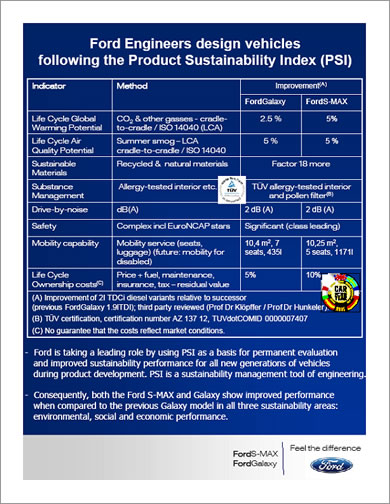What impact does a new vehicle have on air quality over its lifetime? How much noise will it make when it passes people standing on the street? Ford of Europe engineers considered in detail these and a wide range of other sustainability issues when developing the all-new Ford Galaxy and S-MAX models.
Using a new tool called the Product Sustainability Index (PSI), Ford is taking a leading role within the automotive industry by addressing the environmental, social and economic impact of its vehicles from the earliest stages of their development.
Ford's PSI tracks eight product attributes identified as key sustainability elements of a vehicle. These are: life cycle global warming potential (mainly carbon dioxide emissions), life cycle air-quality potential (other air emissions), the use of sustainable materials (recycled and renewable materials), vehicle interior air quality (including TÜV allergy certification), exterior noise impact (drive-by noise), safety (for occupants and pedestrians), mobility capability (seat and luggage capacity relative to vehicle size) and life cycle ownership costs (full costs for the customer over the first three years).
These metrics echo the multi-dimensional nature of sustainability and Ford's holistic approach. An external study of the PSI was conducted by independent experts in the area of life cycle science and sustainability – Professor Dr. Hunkeler (formerly of Vanderbilt University in Tennessee and the University of Lausanne in Switzerland) and Professor Dr. Kloepffer (University of Mainz, Germany). These scholars found the PSI to be a step that aims to provide a full sustainability assessment and as being compliant with ISO 14040, the international Life Cycle Assessment standard.
The PSI provides a basis for permanent evaluation and improved sustainability performance for new generations of vehicles. Consequently, the all-new Ford S-MAX and Galaxy both show improved performance when compared to the previous Galaxy model in all three sustainability areas: environmental, social and economic performance. (See Context for more information.)
For instance, more recycled and renewable materials have been used, life cycle air emissions have been significantly reduced and, at the same time, safety performance has been improved while life cycle cost of ownership has been reduced.
The PSI was also used to improve the environmental performance of the new Mondeo, available in mid-2007.
The following is an example of a label showing the results of PSI analysis of the Ford Galaxy and Ford S-MAX.
